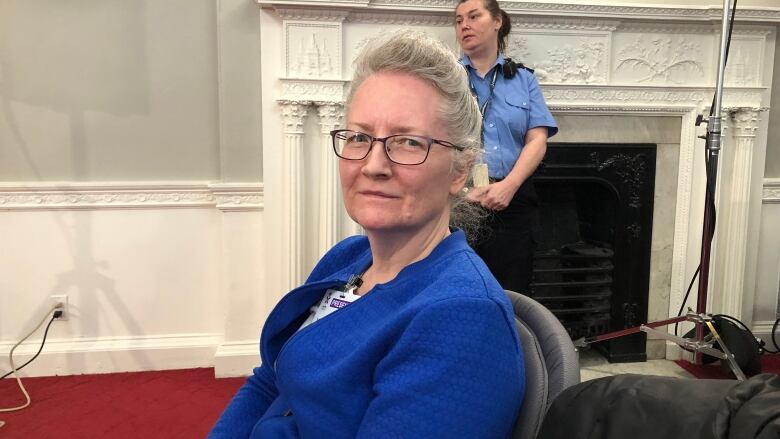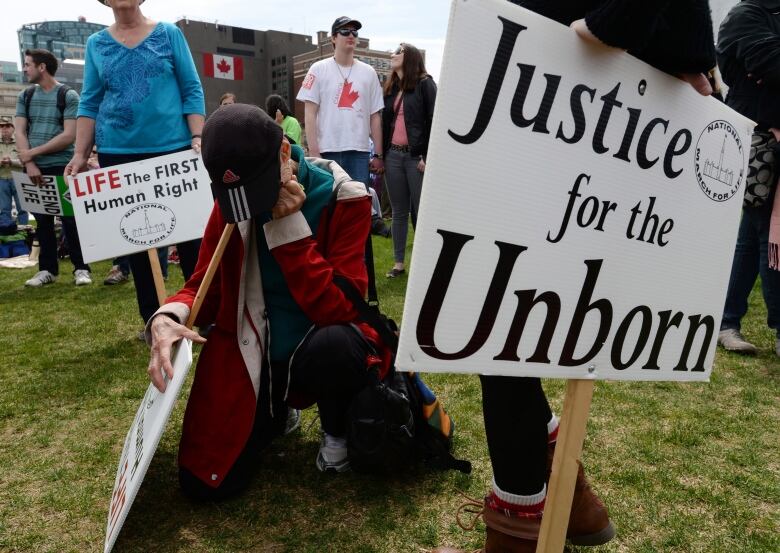Abortion 'bubble zone' bill moves forward despite objections
Public praises, denounces proposed law to limit protests outside clinics, doctors' offices

A private member's bill that would restrict anti-abortion protests in Nova Scotiaand has won all-party support in the legislaturewas both praised and denounced Friday by people who appeared before a committee studying the proposed law.
Catherine Dingle, a long-time supporter of the anti-abortion group Campaign Life Coalition, called on MLAs to abandon the move to restrict where she and others can demonstrate their opposition to abortions.
"It's unnecessary," she told the law amendments committee. "It's ideologically offensive to the pro-choice people, I understand that, but we have done nothing to warrant it."
Bill 242, the Protecting Access to Reproductive Health Care Act, was putforward by NDP MLA Claudia Chender and would ban anti-abortion protests within a 50-metre radius of health-care centres, pharmacies and doctors' offices.
The "bubble zones" would be a way to shield women seeking abortions or related counselling to avoid having to pass through demonstrations on their way into care facilities.

Supporters of the bill see those demonstrations or prayer vigils as a form of harassment or intimidation, but Dingle said the ones she has attendedover the yearshave been peaceful.
"We've never had any complaints," said Dingle. "There's nobodywho could legitimately say that we were harassing them, that we were accosting them, following them, yelling at them, or the kinds of things that we often get accused of."
Dingle said the proposed law would be an infringement on her freedom of speech.
But the woman who spoke immediately after her, Dr. Melissa Brooks, painted a starkly different picture of the protesters and their reason for staging demonstrations outside hospitals and clinics where abortions are performed.
"When protesters stand in front of the hospital they're not there to have their opinion heard," said Brooks, who performs abortions and is medical director of the Women's Choice Clinic in Halifax. "They can come down [to Province House]and have their opinions heard there.
"Their point of being there, the reason why they want to stand in front of the clinic is because they want those women to feel shame. They want those women to feel more stigmatized and they want to harass those women. And their, also, intention is to intimidate people like me and the nurses that I work with."
Brooks told the committee some of her colleagues have felt the need to install bulletproof glass at their homes in order protect their families.
The bill was passed by the law amendments committee and now moves on to another committee for a line-by-line examination.

Ruth Robert, a Campaign Life Coalition organizer, said people associated with her group were not violent, they were "emotional."She said limiting where people who feel strongly about an issue could express their views would severely restrict free speech.
"This means that if you follow your thought process through to conclusion, you will say protests cannot happen in Canada, not merely in the cases of abortion, but any contentious issue," she said.
Gina Grattonagreed with the notion that protests were valid and necessary, having participated in demonstrations at government offices, outside police departments and schools, but she disagreed that anti-abortion actions were peaceful.
"The freedom to peaceful assembly is definitely important, but it is not peaceful if you are harassing vulnerable people," she said. "It is not peaceful if you are flashing violent, graphic images to scare out of making a decision that you don't personally agree with."












_(720p).jpg)


 OFFICIAL HD MUSIC VIDEO.jpg)
.jpg)



























































































